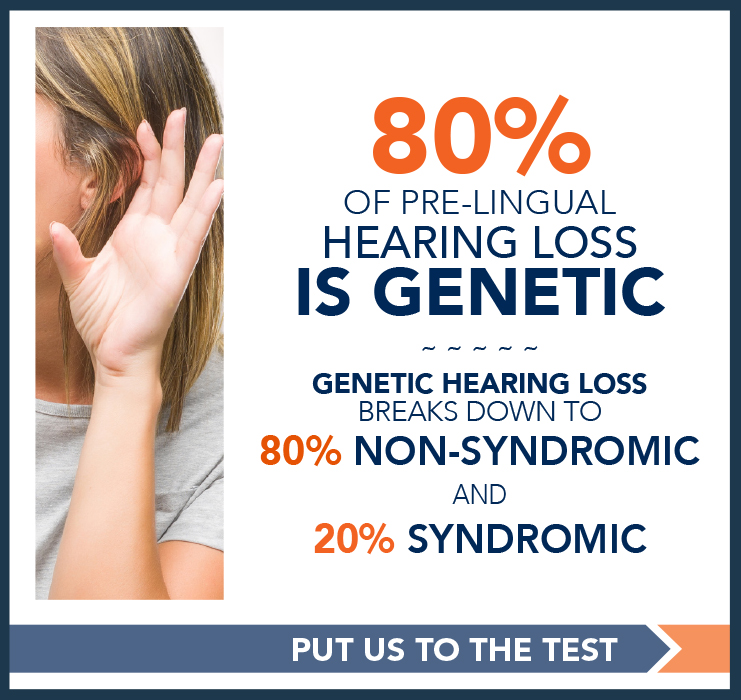Comprehensive Hearing Loss Testing at PreventionGenetics
Published on
Hearing Loss  Hearing loss is one of the most frequent congenital anomalies, affecting up to 1 in 500 newborns worldwide (Sloan-Heggen, et al. 2016). While both genetic and environmental factors contribute to hearing loss, an estimated 80% of pre-lingual hearing loss is due to genetic causes. Hereditary hearing loss is either syndromic or non-syndromic. In syndromic hearing loss (SHL) other clinical features or symptoms affecting other parts of the body are present. In nonsyndromic hearing loss (NSHL) the person has no other clinical features. An estimated 80% of genetic hearing loss is non-syndromic, with the remaining 20% syndromic.
Hearing loss is one of the most frequent congenital anomalies, affecting up to 1 in 500 newborns worldwide (Sloan-Heggen, et al. 2016). While both genetic and environmental factors contribute to hearing loss, an estimated 80% of pre-lingual hearing loss is due to genetic causes. Hereditary hearing loss is either syndromic or non-syndromic. In syndromic hearing loss (SHL) other clinical features or symptoms affecting other parts of the body are present. In nonsyndromic hearing loss (NSHL) the person has no other clinical features. An estimated 80% of genetic hearing loss is non-syndromic, with the remaining 20% syndromic.
Some forms of SHL, called NSHL mimics, have additional associated clinical features that present later in life. For example, Usher syndrome type 1 first presents as congenital profound hearing loss and is followed by delayed motor milestones and associated progressive vision loss that begins in late childhood. Diagnosis of Usher syndrome type 1 is often delayed due to the age of onset of vision loss. Earlier diagnosis allows for more appropriate medical and communication management, which differs for a child who is deaf and one who is both blind and deaf.
Genetic Testing
Genetic testing has become an increasingly important diagnostic tool for hearing loss. A greater than 40% diagnostic yield has been reported in patients with pre-lingual hearing loss using large panels (Azaiez, et al. 2018). The majority of NSHL is monogenic; however, more than 400 syndromes are known to include hearing loss, and variants have been identified in more than 150 genes linked to hearing loss (Sloan-Heggen, et al. 2016).
Genetic testing has the power to:
• Clarify prognosis and suggest proactive treatments
◦ Proactive treatment - what to expect
◦ Identify current treatments
◦ Monitor new treatments
• Impact family members
◦ Identify others affected or carriers (recessive)
◦ Enhance family planning
• Aid in future management of other clinical features associated with syndromic hearing loss
• Save healthcare dollars by eliminating the need for additional tests, such as imaging
PreventionGenetics’ Hearing Loss Tests
PreventionGenetics offers a comprehensive and flexible test menu for hearing loss. Our new 202-gene Hereditary Hearing Loss and Deafness Panel covers both SHL and NSHL. The phenotypic and genetic heterogeneity of hearing loss, including the variable or mild features associated with some SHL genes, was considered in the development of this large panel. Copy number variant (CNV) detection is also an important component of clinical genetic testing for hereditary hearing loss, with CNVs contributing to 18.7% of all positive genetic diagnoses in a large cohort of NSHL patients (Shearer et al. 2014). Our panel includes both sequencing and CNV detection.
In addition to our comprehensive panel, we have several hearing loss panel starters within our custom panels tool, which include subsets of genes in the large panel. The panel starters are categorized by hearing loss type, mode of inheritance, and genes known to be the most common genetic causes of hearing loss.
Because of the heterogeneity of hearing loss, in cases where panel results come back negative or inconclusive, whole exome sequencing may be desired. Reflex to whole exome from the Hereditary Hearing Loss and Deafness Panel or custom panels is optional at a discounted rate.
|
Test# |
Test |
Price |
Reflex to Exome (patient only) |
|
5063 |
$1,290 |
$840 |
For more information on PreventionGenetics’ tests, see our Test Description or Custom Panels Tool.
References
Azaiez et al. 2018. PubMed ID: 30245029
Shearer et al. 2014. PubMed ID: 24963352
Sloan-Heggen et al. 2016. PubMed ID: 26969326
Wroblewska-Seniuk et al. 2017. PubMed ID: 27861465



